-
01-01-2015
Quality of life and physical activity in intensive care professionals from middle São Francisco
Revista Brasileira de Enfermagem. 2015;68(1):26-31
Abstract
Quality of life and physical activity in intensive care professionals from middle São Francisco
Revista Brasileira de Enfermagem. 2015;68(1):26-31
DOI 10.1590/0034-7167.2015680104i
Views0See moreObjective:
the objective was to assess the level of physical activity (LPA) and the quality of life QL of the professionals who work in ICU.
Method:
this was a cross-sectional study carried out in Adult ICUs. LPA was assessed by the International Questionnarie of Physical Activity – short form (IQPA-SF) and the QL by the Medical Outcomes Study 36 (SF-36) questionnaire.
Results:
it was classified active 50.89% out of a total of 59 professionals. Nursing technicians were considered the most active with 60.6%. The QL of the professionals who were considered active were better when compared to inactives, with statistical differences to the category of physical aspects limitation, social aspects and mental health. The working hours were higher than recommend, the physicians were higher than the physical therapist, nurses and technicians nurses (p = 0.046).
Conclusion:
physically active professionals who work in ICU had higher quality of life probably why have lower hours of work and consequently more free time to engage in physical activity.

-
01-01-2015
Learning needs of Nursing students in technical vocational education
Revista Brasileira de Enfermagem. 2015;68(1):20-25
Abstract
Learning needs of Nursing students in technical vocational education
Revista Brasileira de Enfermagem. 2015;68(1):20-25
DOI 10.1590/0034-7167.2015680103i
Views0See moreObjective:
identify learning needs of students of Technical Vocational Education (TVE) in Nursing. Qualitative study conducted in a city of São Paulo state.
Method:
the subjects were students, teachers and coordinators of TVE and students of the bachelor degree who have had contact with TVE. Data collection was performed by questionnaire socioeconomic and cultural circles about the learning needs. For data analysis we used the content analysis.
Results:
it was found that students have difficulties contents not related to nursing as portuguese and mathematics, as well as introductory courses in the course of TVE which possibly may interfere negatively in learning specific content of nursing and the quality of health care.
Conclusion:
it is necessary to rethink the content taught and ways to teach from basic education, as well as the training of teachers who now works in the TVE.
-
01-01-2015
Serious game e-Baby: nursing students’ perception on learning about preterm newborn clinical assessment
Revista Brasileira de Enfermagem. 2015;68(1):13-19
Abstract
Serious game e-Baby: nursing students’ perception on learning about preterm newborn clinical assessment
Revista Brasileira de Enfermagem. 2015;68(1):13-19
DOI 10.1590/0034-7167.2015680102i
Views0See moreObjective:
to evaluate students opinion regarding e-Baby educational technology.
Methodology:
exploratory descriptive study in which participated a sample composed of 14 nursing Portuguese students that used e-Baby digital educational technology in an extracurricular course. To achieve the aim of the study, the data collection was realized through an opinion instrument in Likert scale including the possibility of commentaries by students. Is was also collected data of participants’ characterization.
Results:
students made very satisfactory evaluations regarding the game e-Baby, varying since usability acceptation through suggestions of expansion of the game to other nursing themes.
Conclusion:
serious game e-Baby can be considered a didactic innovation and motivator tool of learning. Besides, it demonstrates have adequate interface in design and educative function aspects, evocating intense interaction between user and computational tool.

-
01-01-2015
Challenges beyond the scientific knowledge production
Revista Brasileira de Enfermagem. 2015;68(1):7-8
Abstract
Challenges beyond the scientific knowledge production
Revista Brasileira de Enfermagem. 2015;68(1):7-8
DOI 10.1590/0034-7167.2015680101p
Views0For several decades, innumerous appeals and reflections on how to build the nursing science and achieve visibility in the scientific world led researchers to make efforts to produce knowledge that contributed to the well-being of people, improving their quality of life, relieving their suffering and transforming the reality in which we live. In addition to […]See more
-
01-01-2017
Assessing the adequacy of workload measurement tools using a quality-based methodology
Revista Brasileira de Enfermagem. 2017;70(1):39-46
Abstract
Assessing the adequacy of workload measurement tools using a quality-based methodology
Revista Brasileira de Enfermagem. 2017;70(1):39-46
DOI 10.1590/0034-7167-2016-0246
Views0See moreABSTRACT
Objective:
determine which tool (NEMS and NAS) is most suitable for use in intensive care units using a quality-based methodology.
Method:
after identifying the opportunity for improvement “Inadequacy of the NEMS for determining nursing workload in the intensive care unit (ICU)”, we assessed the NEMS and the NAS, as a proposed improvement to the NEMS, using quality improvement cycles methodology based on the following criteria: measurement of daily nursing workload on a daily and shift basis; the tool encompasses all nursing activities undertaken in the ICU; and workload assessed per patient and unit.
Results:
there was no significant difference in level of compliance for the NEMS (67%). The comparison NEMS-NAS showed that there was a statistically significant improvement for all criteria except criterion 1. The NEMS only assesses criterion 1 (64.22%); while the NAS assessed all four criteria, obtaining a compliance rate of 64.74% for criteria 1, 2, and 4, and 100% for criterion 3.
Conclusion:
the NAS is more suitable for measuring nursing workload in UCIs.
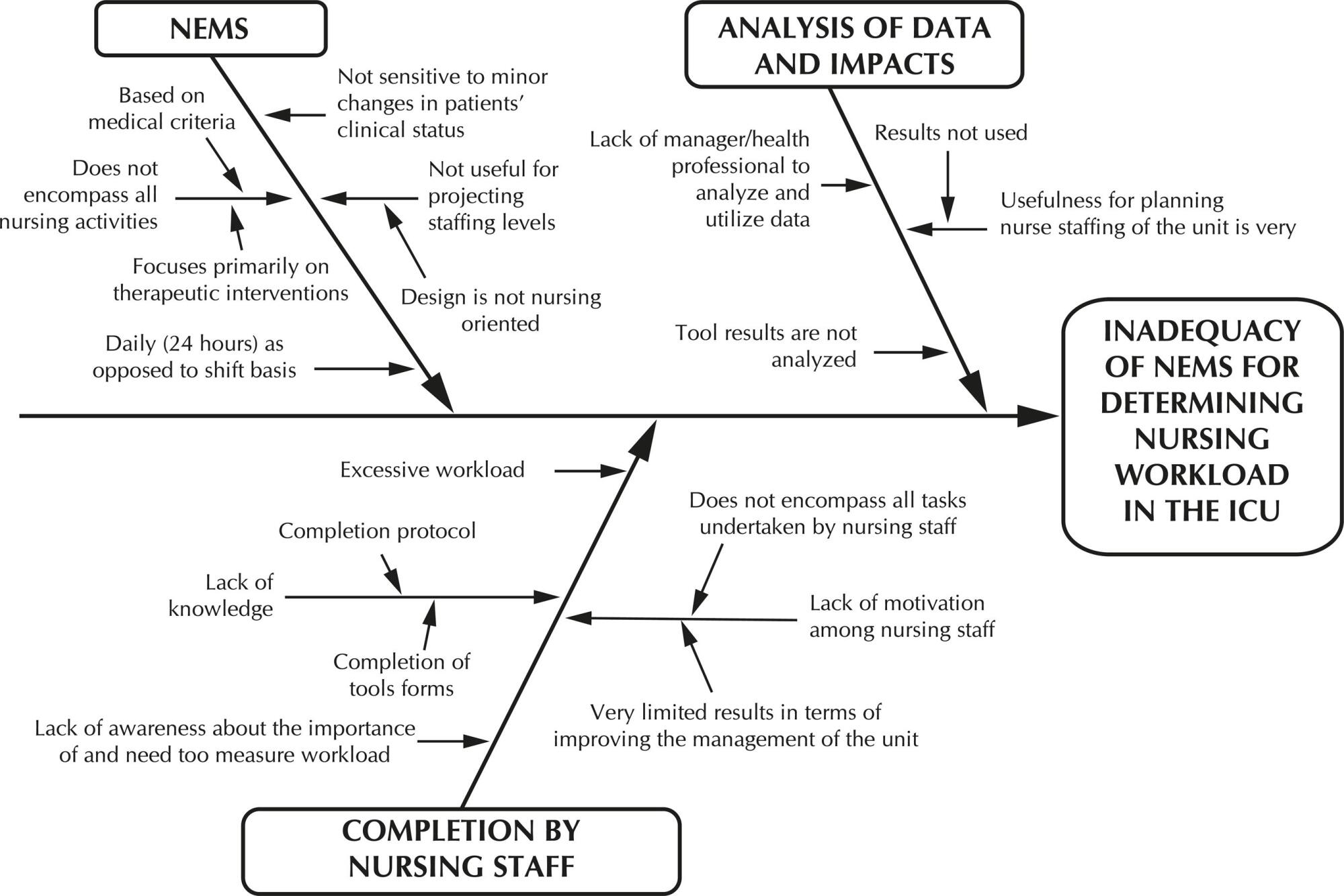
-
01-01-2017
Educational nursing intervention to reduce the hyperphosphatemia in patients on hemodialysis
Revista Brasileira de Enfermagem. 2017;70(1):31-38
Abstract
Educational nursing intervention to reduce the hyperphosphatemia in patients on hemodialysis
Revista Brasileira de Enfermagem. 2017;70(1):31-38
DOI 10.1590/0034-7167-2016-0015
Views0See moreABSTRACT
Objective:
to evaluate the effectiveness of an educational nursing intervention to reduce hyperphosphataemia in chronic renal patients on hemodialysis.
Method:
quasi-experimental study with 63 hyperphosphatemic patients on hemodialysis. The intervention consisted of developing and providing a printed and illustrated manual to patients containing information on disease control. The participant was asked to complete a daily checklist with the aim to reinforce aspects provided in the manual. Laboratory tests and itching intensity were analyzed at the beginning of the study, and at 30 and 60 days after the educational intervention.
Results:
the mean age of participants was 58±13.1 years, with a treatment time of 51.1±44.7 months. A reduction in serum phosphorus values of 7.06 ± 1.43 to 5.80 ± 1.53 (p <0.001) and the intensity of itching after the intervention was observed.
Conclusion:
the educational nursing intervention was effective in reducing phosphate and decreasing itching in hyperphosphatemic patients.
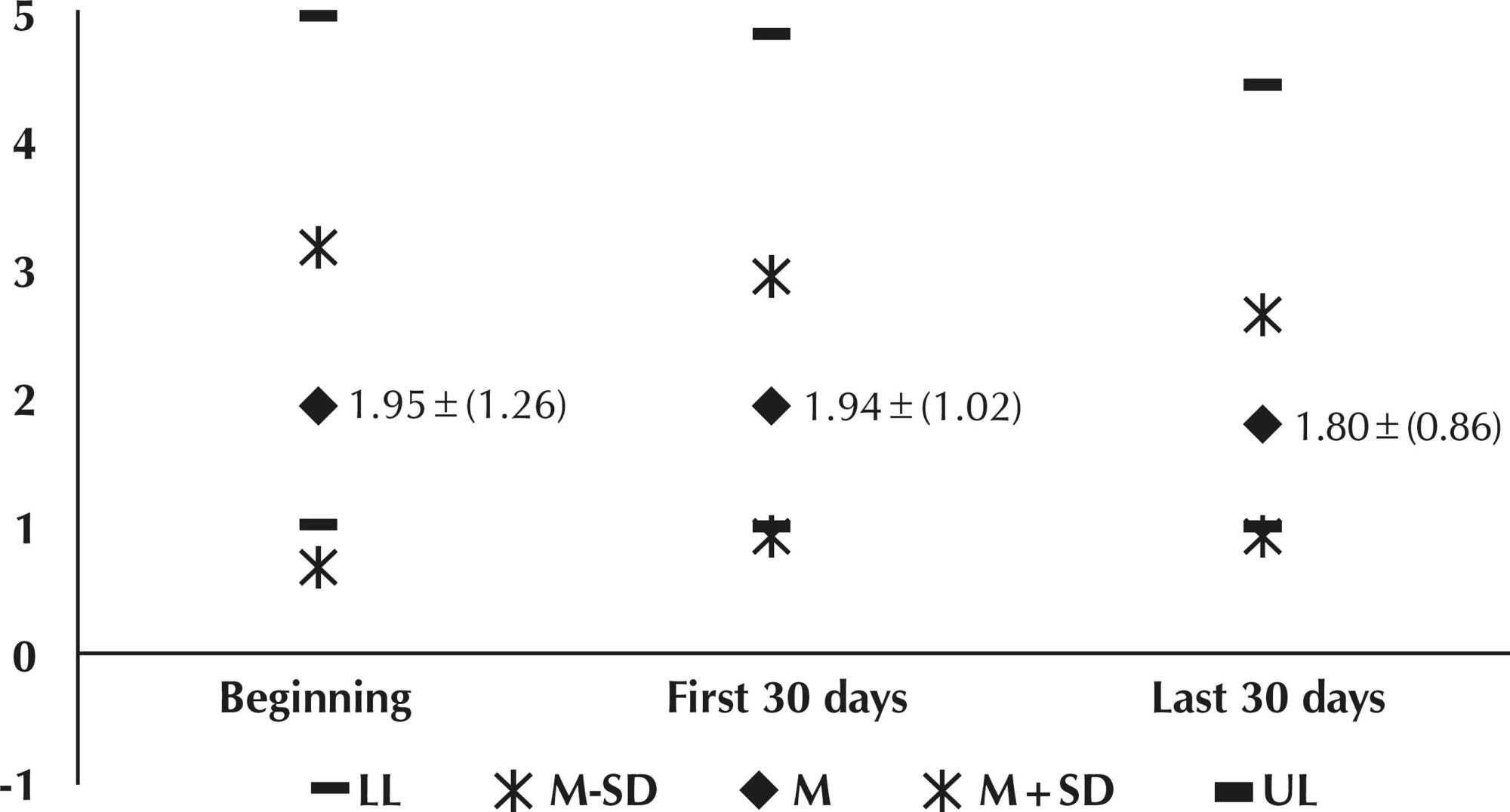
-
01-01-2017
Filial care and the relationship with the elderly in families of different nationalities
Revista Brasileira de Enfermagem. 2017;70(1):22-30
Abstract
Filial care and the relationship with the elderly in families of different nationalities
Revista Brasileira de Enfermagem. 2017;70(1):22-30
DOI 10.1590/0034-7167-2015-0050
Views0See moreABSTRACT
Objective:
identify how filial care and the relationship with the elderly occur in families of different nationalities.
Method:
qualitative study carried out in a town on the triple frontier of Paraná, comprising 33 elderly people of five different nationalities, adopting the Symbolic Interactionism and the Grounded Theory as theoretical-methodological strategy.
Results:
among Lebanese people, the Muslim religion teaches children to obey and respect parents; among French, distant family relationships and institutions for the elderly stand out. Paraguayans hold close family relationships; Chinese people consider filial care as a tacit obligation; Brazilians, in turn, tend to embrace and take care of their parents in old age.
Conclusion:
family care prevailed, but the traditions of each society lead the actions of that care, demanding health professionals’ capacity of recognizing in which context the elderly is inserted.
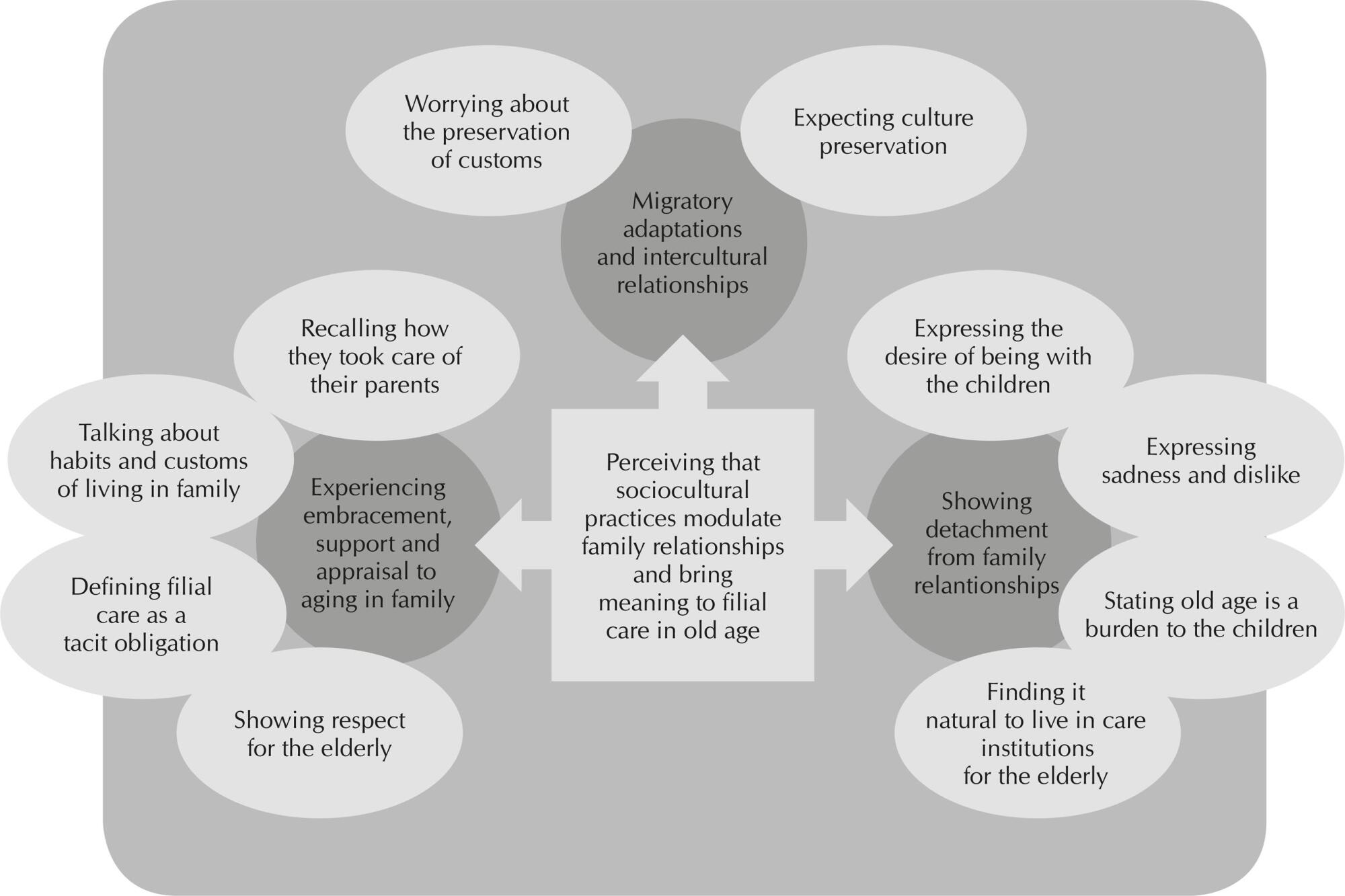
-
01-01-2017
Excesso de volume de líquidos: análise clínica e sociodemográfica em pacientes de hemodiálise
Revista Brasileira de Enfermagem. 2017;70(1):15-21
Abstract
Excesso de volume de líquidos: análise clínica e sociodemográfica em pacientes de hemodiálise
Revista Brasileira de Enfermagem. 2017;70(1):15-21
DOI 10.1590/0034-7167-2015-0138
Views0See moreRESUMEN
Objetivo:
analizar las características definitorias y los factores relacionados con el diagnóstico enfermero de exceso de volumen líquido y su relación con variables sociodemográficas y clínicas en pacientes de hemodiálisis.
Método:
estudio transversal, realizado mediante un formulario y examen físico, con una muestra de 100 pacientes, entre diciembre de 2012 y abril de 2013 en un hospital universitario y una clínica de diálisis.
Resultados:
se encontraron 10 asociaciones estadísticamente significativas entre las características definitorias, factores relacionados de volumen de exceso de líquido y las variables sociodemográficas y clínicas.
Conclusión:
las características definitorias y los factores relacionados de exceso de volumen líquido podrían estar influenciados por variables sociodemográficas y clínicas en clientes de hemodiálisis.
-
01-01-2017
Excess fluid volume: sociodemographic and clinical analysis in haemodialysis patients
Revista Brasileira de Enfermagem. 2017;70(1):15-21
Abstract
Excess fluid volume: sociodemographic and clinical analysis in haemodialysis patients
Revista Brasileira de Enfermagem. 2017;70(1):15-21
DOI 10.1590/0034-7167-2015-0138
Views0See moreABSTRACT
Objective:
To analyse the defining characteristics and related factors in the nursing diagnosis Excess fluid volume and its relationship to sociodemographic and clinical variables in haemodialysis patients.
Method:
Cross-sectional study, conducted using a form and physical examination, with a sample of 100 patients, between December 2012 and April 2013 at a university hospital and a dialysis clinic.
Results:
It was found 10 significant statistical associations between the defining characteristics/ related factors of Excess fluid volume and the sociodemographic and clinical variables.
Conclusion:
The defining characteristics and related factors of Excess fluid volume could be influenced by sociodemographic and clinical variables in haemodialysis clientele.
-
01-01-2017
Facing challenges in times of adversity
Revista Brasileira de Enfermagem. 2017;70(1):1-2
Abstract
Facing challenges in times of adversity
Revista Brasileira de Enfermagem. 2017;70(1):1-2
DOI 10.1590/0034-7167.2017700101
Views0At the confluence of tradition, respect for history and a critical approach to the issues inherent to the development of the nursing profession, the Brazilian Nursing Association (ABEn) has been consolidating an exemplary trajectory in Brazilian society. Throughout its history, the reflections, discussions and decisions on pertinent and urgent subjects of the profession have made […]See more -
01-01-2017
Enfrentando desafios em tempos de adversidades
Revista Brasileira de Enfermagem. 2017;70(1):1-2
Abstract
Enfrentando desafios em tempos de adversidades
Revista Brasileira de Enfermagem. 2017;70(1):1-2
DOI 10.1590/0034-7167.2017700101
Views0Na confluência da tradição, do respeito pela história e da abordagem crítica das questões inerentes ao desenvolvimento da profissão de enfermagem, a Associação Brasileira de Enfermagem (ABEn) vem consolidando uma trajetória exemplar na sociedade brasileira. Ao longo da sua história, as reflexões, discussões e decisões sobre assuntos pertinentes e prementes da profissão têm possibilitado intervenções […]See more -
01-01-2016
Epistemology of nursing care: a reflection on its foundations
Revista Brasileira de Enfermagem. 2016;69(6):1240-1245
Abstract
Epistemology of nursing care: a reflection on its foundations
Revista Brasileira de Enfermagem. 2016;69(6):1240-1245
DOI 10.1590/0034-7167-2016-0331
Views0See moreABSTRACT
Objective:
to reflect on nursing care and its epistemology from its historical, theoretical, philosophical, spiritual dimensions and as a social practice.
Method:
discussions originated in the discipline “Epistemology of caring”, from the graduate nursing program of the School of Nursing, Federal University of Minas Gerais, and in critical analysis of nursing literature together with the professional practice of the authors.
Results:
we identified the necessity of developing a critical conscience on health care provision, research, and teaching, as well as on challenges in maintaining high standards of working interpersonal relationships, which has a profound impact on population health.
Conclusion:
we suggest the rescue of integrality, humanization, unity, and spirituality in researches and practices of individual, familiar, and community care, as an advance in incorporating epistemology of caring in nursing.
-
ORIGINAL ARTICLE12-04-2023
Work-related stress among nurses in the COVID-19 pandemic: What are the contributing factors?
Revista Brasileira de Enfermagem. 2023;76:e20220586
Abstract
ORIGINAL ARTICLEWork-related stress among nurses in the COVID-19 pandemic: What are the contributing factors?
Revista Brasileira de Enfermagem. 2023;76:e20220586
DOI 10.1590/0034-7167-2022-0586
Views0See moreABSTRACT
Objective:
To analyze the contributing factors of work-related stress among nurses in the COVID-19 pandemic.
Methods:
A cross-sectional study was conducted with 101 nurse practitioners from two hospitals in West Java, Indonesia. We distributed an online questionnaire to evaluate work-related stress and the data were analyzed using ordinal logistic regression.
Results:
More than half of the nurses experienced moderate work-related stress. The study revealed that nurses aged over 35 years old had a lower likelihood of experiencing work-related stress (AOR: 0.173; 95%CI: 0.038-0.782). Married nurses had a higher likelihood (AOR: 7.156; 95% CI: 1.456-35.163). Additionally, nurses with low and moderate workloads had a lower likelihood (AOR: 0.003; 95%CI: 0.000-0.051) and (AOR: 0.025; 95%CI: 0.005-0.116), respectively.
Conclusion:
The consideration of age, marital status, and workload is essential in effectively addressing work-related stress among nurse practitioners.
-
ORIGINAL ARTICLE12-04-2023
Incidence and risk factors of pressure injuries in critically ill patients with COVID-19
Revista Brasileira de Enfermagem. 2023;76:e20220553
Abstract
ORIGINAL ARTICLEIncidence and risk factors of pressure injuries in critically ill patients with COVID-19
Revista Brasileira de Enfermagem. 2023;76:e20220553
DOI 10.1590/0034-7167-2022-0553
Views0See moreABSTRACT
Objective:
to analyze pressure injury (PI) incidence and risk factors in patients with COVID-19 admitted to an Intensive Care Unit and characterize the identified PIs.
Method:
a retrospective cohort study, consisting of 668 patients, carried out between March 2020 and February 2021. Clinical/demographic and PI variables were collected from medical records and electronic database. Data were analyzed using descriptive and inferential statistics. Logistic regression was performed to analyze risk factors for PI.
Results:
PI incidence was 30.2% (n=202), with the majority located in the sacral region (52.9%) and in stage 1 (39%). Risk factors were age (p<0.001), Diabetes Mellitus (p=0.005), length of stay (p<0.001), immunosuppression (p=0.034), nutritional risk (p=0.015) and mechanical ventilation (p<0.001).
Conclusion:
PI incidence in critically ill patients with COVID-19 was high.

-
12-04-2023
Enfermagem e os Objetivos de Desenvolvimento Sustentável (ODS): Um Compromisso Essencial
Revista Brasileira de Enfermagem. 2023;76(6):e760601
Abstract
Enfermagem e os Objetivos de Desenvolvimento Sustentável (ODS): Um Compromisso Essencial
Revista Brasileira de Enfermagem. 2023;76(6):e760601
DOI 10.1590/0034-7167.2023760601pt
Views0Os Objetivos de Desenvolvimento Sustentável (ODS) são uma iniciativa global lançada pela Organização das Nações Unidas (ONU) em setembro de 2015 como parte da Agenda 2030 para o Desenvolvimento Sustentável, cujos objetivos sumarizam um apelo universal à ação para acabar com a pobreza, proteger o meio ambiente e garantir que todas as pessoas tenham acesso […]See more -
12-04-2023
Nursing and the Sustainable Development Goals (SDGs): An Essential Commitment
Revista Brasileira de Enfermagem. 2023;76(6):e760601
Abstract
Nursing and the Sustainable Development Goals (SDGs): An Essential Commitment
Revista Brasileira de Enfermagem. 2023;76(6):e760601
DOI 10.1590/0034-7167.2023760601
Views0The Sustainable Development Goals (SDGs) are a global initiative launched by the United Nations (UN) in September 2015 as part of the 2030 Agenda for Sustainable Development, whose objectives summarize a universal call to action to end poverty, protect the environment and ensure that all people have access to opportunities and well-being, all in an […]See more -
ERRATUM12-04-2023
ERRATUM
Revista Brasileira de Enfermagem. 2023;76(6):e2023n6e06
Abstract
ERRATUMERRATUM
Revista Brasileira de Enfermagem. 2023;76(6):e2023n6e06
DOI 10.1590/0034-7167.20237606e06
Views0In the article “Undergraduate nursing students’ knowledge and experience in infusion therapy and peripheral vascular acces”, with DOI number: , published in Revista Brasileira de Enfermagem, 2023;76(3): e20220219, authored:Where it read:[…]See more -
12-04-2023
Elder abuse: a conceptual analysis
Revista Brasileira de Enfermagem. 2023;76(6):e20230150
Abstract
Elder abuse: a conceptual analysis
Revista Brasileira de Enfermagem. 2023;76(6):e20230150
DOI 10.1590/0034-7167-2023-0150
Views0See moreABSTRACT
Objective:
to analyze the concept of elder abuse and identify its respective antecedents, attributes and consequents.
Methods:
this is a conceptual analysis according to Walker and Avant’s proposition. The search for the concept was mediated by an integrative review in the LILACS, PubMed, CINAHL, Web of Science and BDENF databases.
Results:
as antecedents, female, family member, low social support and low income or socioeconomic conditions stand out. Attributes were threats and/or intimidation, intentional use of physical force, using resources without authorization, unwanted sexual activity, offering low insufficient amount of nutrients for older adults and not meeting older adults’ affective/emotional needs. Consequents were psychological disorders, dependence on aggressors, environment of insecurity and damage/loss of human rights or human dignity.
Final considerations:
the phenomenon under discussion is broad and multifaceted, suggesting expansion of studies related to the theme in order to explore it in detail.
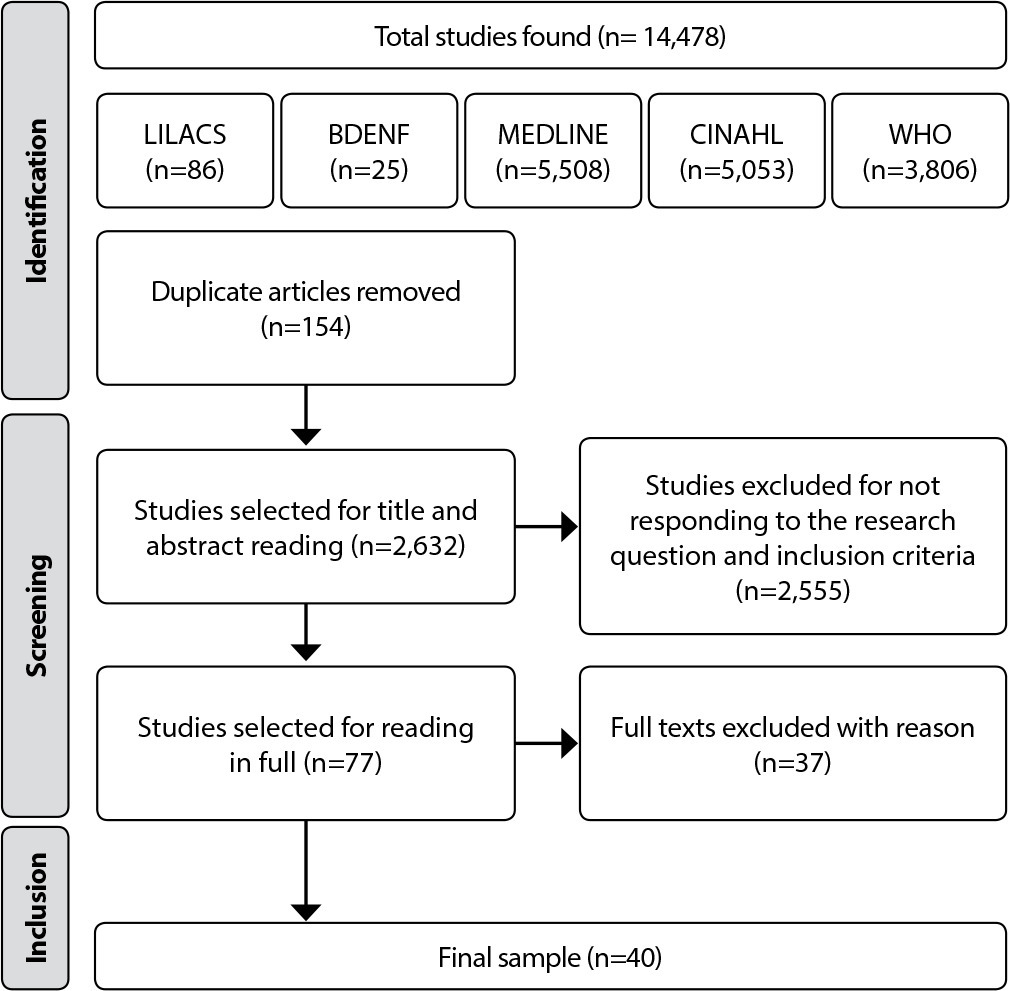
-
ORIGINAL ARTICLE12-04-2023
Meanings of nurses’ role in Child and Adolescent Psychosocial Care Centers
Revista Brasileira de Enfermagem. 2023;76(6):e20230124
Abstract
ORIGINAL ARTICLEMeanings of nurses’ role in Child and Adolescent Psychosocial Care Centers
Revista Brasileira de Enfermagem. 2023;76(6):e20230124
DOI 10.1590/0034-7167-2023-0124
Views0See moreABSTRACT
Objective:
to analyze the meaning attributed to nurses’ role in mental health care in Child and Adolescent Psychosocial Care Centers.
Methods:
qualitative research, anchored in the paradigm of complexity. Data collection was carried out through online semi-structured interviews with ten nurses from São Paulo, between March and September 2022, being analyzed thematically.
Results:
the diversity and specificity of a child and adolescent mental health clinic, with the need for expanded, territorial and intersectoral care, were unveiled in addition to a fragmented training in the area. There was a need for a deconstruction of being a nurse to make it possible to produce more inclusive and salutogenic practices.
Final considerations:
the need for training nurses with adequate knowledge and skills to care for the mental health of children, adolescents and their families is reinforced as well as permanent education of working teams.
-
12-04-2023
Quantification of blood loss for the diagnosis of postpartum hemorrhage: a systematic review and meta-analysis
Revista Brasileira de Enfermagem. 2023;76(6):e20230070
Abstract
Quantification of blood loss for the diagnosis of postpartum hemorrhage: a systematic review and meta-analysis
Revista Brasileira de Enfermagem. 2023;76(6):e20230070
DOI 10.1590/0034-7167-2023-0070
Views0See moreABSTRACT
Objective:
to compare the effectiveness of different diagnostic methods to estimate postpartum blood volume loss.
Methods:
a systematic review of effectiveness according to PRISMA and JBI Protocol. Searches in PubMed/MEDLINE, LILACS, Scopus, Embase, Web of Science and CINAHL, with descriptor “Postpartum Hemorrhage” associated with keyword “Quantification of Blood Loss”. Tabulated extracted data, presented in metasynthesis and meta-analysis was applied to quantitative data. To assess risk of bias, JBI Appraisal Tools were applied.
Results:
fourteen studies were included, published between 2006 and 2021. Quantification of loss by any method was superior to visual estimation and is highly recommended, however the studies’ high heterogeneity did not allow estimating this association.
Conclusion:
the studies’ high heterogeneity, with a probable margin of error given the uncontrolled factors, indicates the need for further studies, however quantification proved to be effective in relation to visual estimate. PROSPERO registration CRD 42021234486.
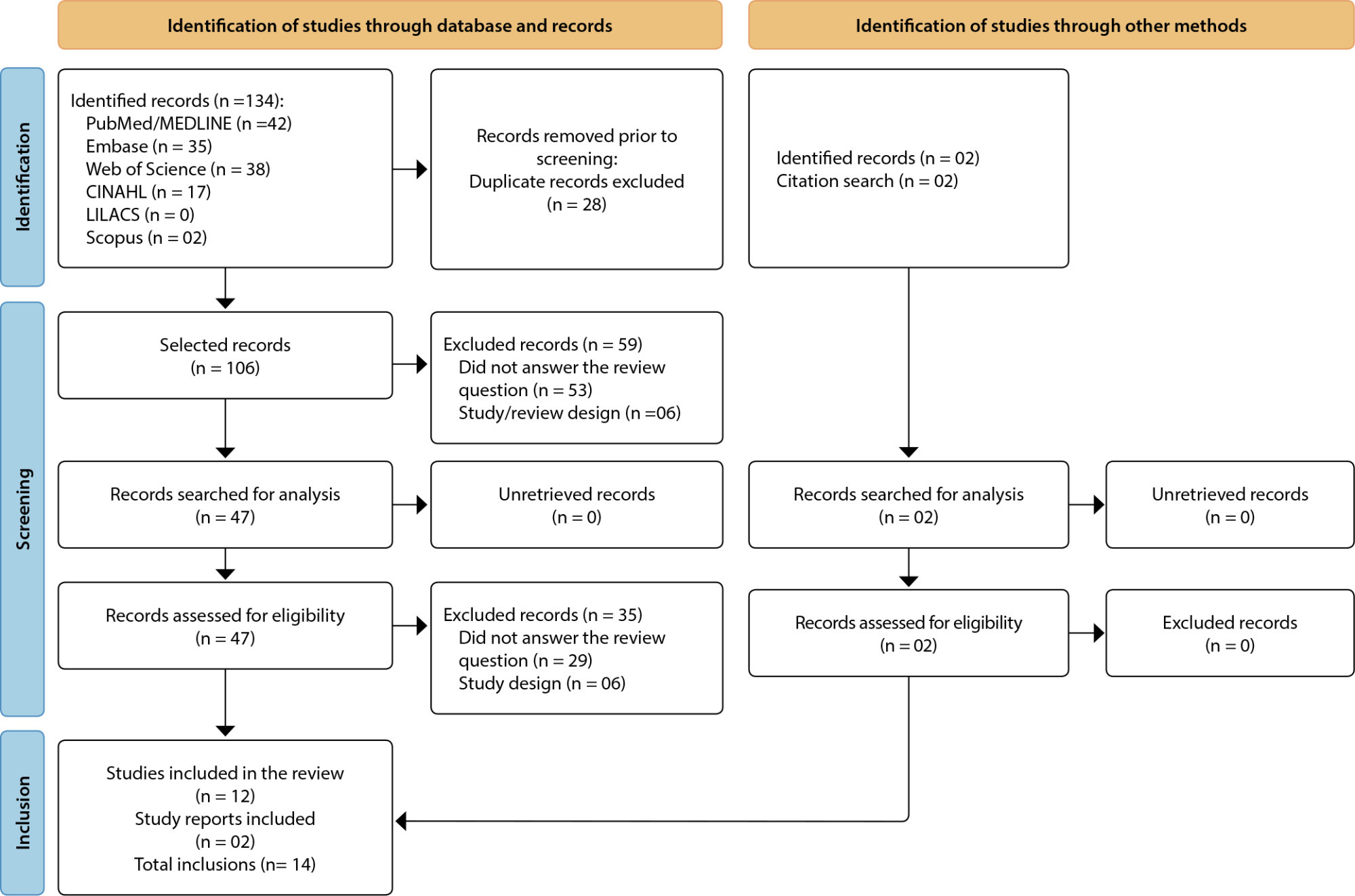
Search
Search in:
Nuvem de Tags
Adolescente (85) Atenção Primária à Saúde (239) COVID-19 (91) Criança (91) Cuidados de Enfermagem (269) Educação em Enfermagem (151) Educação em Saúde (139) Enfermagem (930) Enfermagem Pediátrica (86) Estudantes de Enfermagem (77) Estudos de Validação (131) Família (87) Idoso (208) Promoção da Saúde (99) Qualidade de Vida (104) Saúde do Trabalhador (86) Saúde Mental (145) Saúde Pública (82) Segurança do Paciente (150) Tecnologia Educacional (100)



